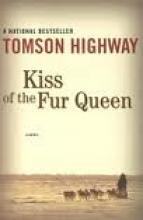“Mush!” the hunter cried into the wind, through the rising vapour of a northern Manitoba February, so crisp, so dry, the snow creaked underfoot, the caribou hunter Abraham Okinasis drove his sled and team of eight grey huskies through the orange-rose-tinted dusk.”
He was racing in desperation to win the 1951 Millington Cup World Championship Dog Derby, all the while praying the Lord’s Prayer and beseeching the God of Heaven to help him. When he had won it, the first Indian to ever do so, the trophy was handed to him by the 1951 Fur Queen Pageant winner. The indescribably beautiful woman was dressed in full regalia of the legendary Fur Queen of Cree mythology. To the great caribou hunter, in his dreamlike state, she became the actual Fur Queen, who had come down from the starry heavens and had kissed his cheek. In unspeakable joy, he returned to his faithful wife, Mariesis, to a love that was deep and true. In their joy, a child was being released by the Fur Queen, and tumbling through the endless starry heavens, it would in due time land in the lap of Mariesis and in the arms of her husband.
Thus the story is set in the idyllic culture of the Cree, and in the simple faith in the Heavenly Father. But the story moves on, as the children, one by one, are taken from their parents, home and community to the Residential School, which was 600 miles away by plane and was run by Catholic Oblates. Here everything the children held dear was taken from them, the security of home and community, the Cree culture and language and even their names. Though the priests intoned holy words and teaching, their lives did not hold true. In the dark of night, they sexually abused the children.
The story goes on, how the children endured loneliness and rootlessness, having lost their Cree identity and values, and became disillusioned with the white man’s religion. Nevertheless, the two sons of Okinasis found their gift in music and dance, soaring to dizzying heights of acclaim and fame, yet remained rootless in values. The story gives way to sordid details of undisciplined living, leading to the death of the one. His brother barred the way to the death chamber for the priest who would give last rites to the dying man. Instead he invoked the ancient rites of passage to the realms beyond, that had given comfort and meaning to the Cree from ages past.
This novel is thought provoking and raises awareness of the unjust and hypocritical policies that have been foisted on the Indians, destroying their culture and their very lives. The author is harshly critical of the Catholic Church and of Government policies, but leaves no room in his narrative for the love of Christ as witnessed in those who truly follow in His steps. Instead, he delves deeper into the sordid depravity of people who sink ever deeper into the morass of life without a compass.
I believe this novel has value for students of Peace and Justice, and for raising awareness in responsible adults, that they might seek justice and economic opportunity for the Indian people. It is also a sombre reminder of the harm that is done by those who say, “Lord, Lord!” but do not show integrity in their lives. I do not recommend this book for a church library. The ongoing portrayal of perverted sexual behavior and cruelty reads like a pornographic document. In my youth, I heard a saying, “It is not necessary to feed on the dung heap, to know what is good food.” I do not believe that innocent young minds need to be filled with the graphic details of sin and depravity, to show them the value of chaste and purposeful living.
The author, Tomson Highway, is Cree, and has given the reader a sensitive picture of the culture to which he was born, and of the inner life of his people. In this, the reader will find value and enjoyment, tempered with sadness.
--Aug. 28, 2012




Add new comment
Canadian Mennonite invites comments and encourages constructive discussion about our content. Actual full names (first and last) are required. Comments are moderated and may be edited. They will not appear online until approved and will be posted during business hours. Some comments may be reproduced in print.